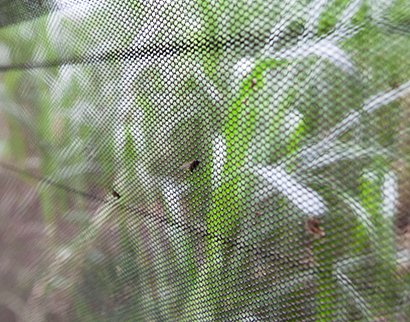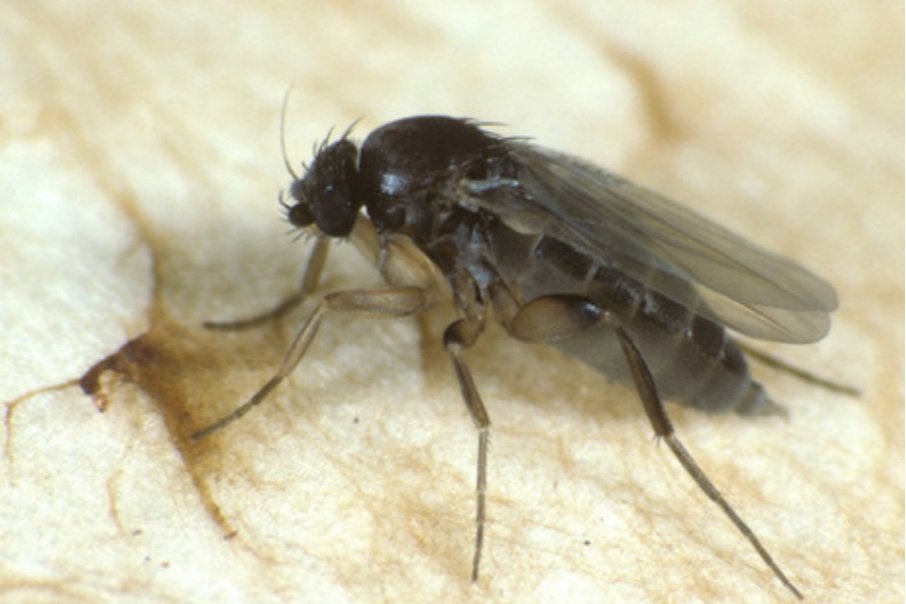Challenges and opportunities for the biological control of mushroom phorid flies using predatory mites
Phorid flies (Megaselia halterata) are a significant pest in button mushroom cultivation systems and are currently an issue on a number of Australian farms. Gravid females are attracted to the odour of actively growing mycelium during both spawn run and fill, and lay eggs in the compost.
While emerging larvae feed directly on mushroom mycelium, their significant impact on yield and quality is mainly due to their ability to vector mites, Lecanicillium fungicola (dry bubble) and Trichoderma aggressivum (compost green mould). This makes them a significant biosecurity risk to individual farms.
Complementing management with biological agents - Aimee McKinnon
Aimee is a research scientist for Agriculture Victoria in the Microbial Sciences, Pests, and Diseases (MSPD) group. With expertise in microbial-based biopesticides (biorationals) for use in integrated pest and disease management (IPDM), Aimee’s research focuses on understanding how microbial agents work to control insect pests and pathogens when applied to growing systems, with the broader aim to determine synergistic management practices, and to optimise the delivery of biological control agents. Since 2022, Aimee has been reviewing and evaluating prospective biopesticide agents and formulations for their efficacy to control key pests and diseases of commercial mushrooms in Australia, with a focus on mushroom flies and the pathogens that they may vector.
Michael Wolfin’s war on flies
Phorid and sciarid flies are not just unwelcome visitors on mushroom farms, they are persistent invaders whose impacts can be devastating.
Michael Wolfin is not your everyday entomologist. Driven by a passion for problem-solving since graduating, he found his way to Pennsylvania’s mushroom farms, where fly infestations pose ongoing and significant challenges.
Phorid fly larvae feed directly on the growing mushroom mycelium, whereas sciarids feed on organic matter within the compost itself. However, both can transmit disease and contaminate mushroom flushes, ruining up to 40% of the crop. This translates into substantial losses for growers.
My pesticide doesn’t work!
When applied correctly, pesticides are a very effective component of a mushroom farm’s IPDM (Integrated Pest and Disease Management) strategy, rapidly reducing pest and pathogen populations. When a pesticide seems no longer to work, or appears to work less effectively than before, it is very concerning. The purchase of pesticides is a significant expense for mushroom farms particularly when faced with increasing costs across the board. It is important from an economic perspective that pesticide effectiveness is optimised and that growers see a good return on their investment.
When applied correctly, pesticides are a very effective component of a mushroom farm’s IPDM (Integrated Pest and Disease Management) strategy, rapidly reducing pest and pathogen populations. When a pesticide seems no longer to work, or appears to work less effectively than before, it is very concerning. The purchase of pesticides is a significant expense for mushroom farms particularly when faced with increasing costs across the board. It is important from an economic perspective that pesticide effectiveness is optimised and that growers see a good return on their investment.
Phorid Ecology and Management
Flies in mushroom crops are a persistent, annoying, and occasionally, very damaging issue that all growers will face at some time. Most research has focussed on sciarids (Lycoriella spp.), often the most common species present. The maggots feed on organic matter in compost and readily adapt to captivity, making research relatively easy. Mushroom phorid flies may be a minor problem on most Australian farms, but in many countries – including Spain, Turkey, India, the UK and the US – they are a major pest. Yield losses of 10 to 40% have been widely reported. Some Australian farms are now also reporting persistent populations of these flies.
Flies in mushroom crops are a persistent, annoying, and occasionally, very damaging issue that all growers will face at some time. Most research has focussed on sciarids (Lycoriella spp.), often the most common species present. The maggots feed on organic matter in compost and readily adapt to captivity, making research relatively easy. Mushroom phorid flies may be a minor problem on most Australian farms, but in many countries – including Spain, Turkey, India, the UK and the US – they are a major pest. Yield losses of 10 to 40% have been widely reported. Some Australian farms are now also reporting persistent populations of these flies.
MU21002 - Desktop review of pathway risks for the mushroom industry - Agaricus mushrooms and growth substrate imports
Key research provider: Applied Horticultural Research
This investment is identifying exotic mushroom pests and diseases and investigating the potential ways that they could enter Australia. Managing pests and diseases is a key priority for the Australian mushroom industry, as the entry of new pests and diseases could pose a serious threat.
The project team will investigate all possible routes for these pests and diseases to enter Australia, such as through imported Agaricus or exotic mushroom varieties, or other means including substrates (e.g. logs) or inoculum.
The research team will collaborate with the project Development of a biosecurity plan for Australian mushrooms (MU18006) as well as other industry risk-related projects and key industry organisations.
The research team will collaborate with the project Development of a biosecurity plan for Australian mushrooms (MU18006) and other industry risk-related projects and key industry organisations.
Peak fly season is nearly upon us - are you ready?
With the arrival of spring and, as the sap rises, thoughts turn to what the upcoming summer and autumn will bring.
Unfortunately, hot on the heels of Santa and his elves will come the peak fly season. Summer is also the time that farms experience disruptions to routines and rostering as many farm staff take holiday leave.
During this time, it is often difficult to allocate sufficient resources to perform mundane but crucial tasks such as pest and disease monitoring and spot treatments.
This article was originally produced for the Australian Mushrooms journal 2020 Issue 3
Lecanicillium fungicola– Dry Bubble disease
Dry Bubble is the common name given to a serious fungal disease affecting cultivated Agaricus bisporus crops. It is caused by the soil-borne mycoparasites Lecanicillium fungicola var fungicola (syn: Verticillium fungicola; Verticillium malthousei) which is found in Europe and Lecanicillium fungicola var aleophilum which is more common in North American Agaricus crops, including Agaricus bitorquis. Dry Bubble is consistently the most significant problem facing growers wherever button mushrooms are grown, including Australia.
Lecanicillium fungicola was first identified as a mushroom pathogen in France in 1892 and was described as the causal agent of ‘La mole’ disease, the French term for what we now refer to as Dry Bubble. But despite more than 130 years since its first appearance, Dry Bubble continues to have a detrimental impact on mushroom production. The disease causes significant losses estimated at 2-4% of total revenue annually and poor control of the disease may result in losses approaching 20-25% or more, while uncontrolled disease can result in farm closure.
Nematodes: A fly-in-fly-out pest of mushrooms crops
Long distance dispersal of nematodes occurs by a process called ‘phoresy’, the transport of a small animal by a larger animal.
In mushroom grow rooms, nematodes attach to Sciarid flies and are transported to fresh mushroom beds to establish new colonies and new infections.
This is further evidence demonstrating why effective fly control is highly significant in successful management of mushroom diseases and pests.
This article was originally produced for the Australian Mushrooms Journal 2020 Issue 1
Action points to control Sciarid & Phorid flies
Flies are effective vectors of disease because the sticky disease spores attach themselves to the flies legs and the flies transport them from crop to crop.
Sciarid and phorid flies can breed in bushland, ‘waste’ or ‘spent’ compost in the farm environment and, most efficiently of all, in growing rooms.
The odour associated with the Phase 3 compost arriving on a farm either in bulk or blocks acts like a strong magnet to attract flies to the new crop.
The fact that a female sciarid can produce around 100 offspring and a female phorid can produce around 50 offspring means that new crops need to be strongly protected from invasion by adults and a holistic and integrated approach to fly control is needed.



















